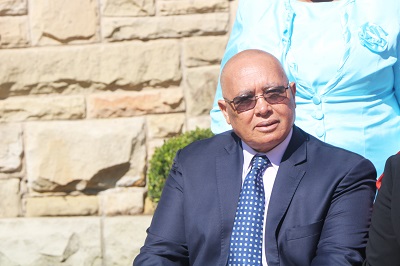By: Thoboloko Ntšonyane
THABA-TSEKA- The Minister of Law and Justice Hon Richard Ramoeletsi has joined the growing chorus of voices advocating for zero tolerance against gender-based violence (GBV) and child marriages.
There are ever increasing calls to ongoing efforts to combat the GBV and child marriages which violate human rights especially on children, youth and women.
The Minister made this call on Sunday in the Thaba-Tseka district during the commemoration of the annual Human Rights Day which coincides with the end of 16 Days of Activism against GBV that is observed from November 25 to December 10 every year.
Human Rights Day on 10 December is a reflection and celebration of the United Nations (UN) creation and adoption of the Universal Declaration on Human Rights (UDHR) in 1948.
The theme for his year is ‘Human Rights Education For, With and by Youth’.
“Human rights belong equally to each of us and bind us together as a global community with the same ideals and values. As a global community, we all share a day in common.
“Itis also the day on which we mark the end of the 16 days of activism against gender based violence .As we also mark the end of the 16 days of activism against gender based violence, let us remember that gender based violence is a human rights and public health issue that limits the individual and societal development,” he said.
Ramoeletsi stressed that there should be zero tolerance to gender-based violence, early child marriages, to any offending and archaic cultural practices and unaccepted acts such as rape and killings of women and girls.
He said the government will “redouble its efforts” in the fight against GBV and “exert decisive leadership” to answer the call to free women and girls from violence.
He appealed to the Thaba-Tseka community to continue to support the capacity of local communities to influence changes in attitudes and behaviour in order to reduce GBV.
The customary marriage law was criticised for endorsing child marriage since it did not stipulate age in which a child could be married and to address this, there was a move to amend certain provisions and impose stricter penalties for child marriages to ban this practice.
The girls were usually at the receiving end of this practice as some would even discontinue school to look after children.
Although this is continuing, there are reportedly fewer cases as the government had mounted a countrywide campaign to sensitise communities and traditional leaders against the child marriage practice.
Also a key voice against child marriage is Queen ‘Masenate Mohato Seeiso, a patron of Hlokomela Banana.
According to Afrobarometer – a non-partisan African research network that conducts surveys on democracy, governance issues and quality of life, in Lesotho 56 percent of the interviewed respondents believe that women will be victimized for reporting on GBV acts.
The study findings further revealed that 38 percent of the Africans interviewed in 39 participating countries are of the opinion that GBV is “somewhat common” and “very common” in their communities.
Afrobarometer had previously indicated that “GBV is a serious threat to the nation both developmentally and economically, recognised as one of the drivers of HIV in a country that has the third-highest prevalence rate in the world at 23.2% (UNAIDS,2021)”.
Of the respondents surveyed, 69 percent of the African respondents surveyed say that it is “never” justified for a man to use physical force to discipline his wife.
In June last year, the parliament passed the Counter Domestic Violence Bill, 2021 as an effort in addressing the GBV.
The United Nations Secretary-General’s Unite by 2030 drive calls for a global action to increase awareness, galvanize advocacy efforts and spread the messages to combat and end all types of violence especially against women and girls.
For this year’s edition, the Unite theme is ‘Invest to Prevent Violence against Women and Girls’.
“In every country and culture, more action is needed to ensure women in all their diversity live free of violence and coercion. Health impacts of violence can last a lifetime, affecting physical, mental, sexual, and reproductive health,” says the World Health Organisation (WHO).
The Minister continued: “In full recognition and honour of the bedrock priceless of human rights: universality, equality and non- discrimination, indivisibility and interdependence, we are going to give away some packages to 60 individuals from the marginalized groups of society.
“Practices worldwide have proved that promotion of human rights is a project without a life span that demands continuous and steady or ever rising efforts from equally committed partners. Allow me at this juncture to register my sincere appreciation to the Civil Society in Lesotho who have partnered and are still partnering with us today in translating human rights into reality.
“It would be remiss of me if I could conclude my statement without appreciating the valuable work that the UNDP [United Nations Development Programme] Office for Human Rights and the EU [European Union] has undertaken in the promotion and protection of human rights in Lesotho. Let us intensify our efforts to fulfill our collective responsibility of ensuring that life in dignity and self-fulfillment becomes an opportunity to every Mosotho.”


